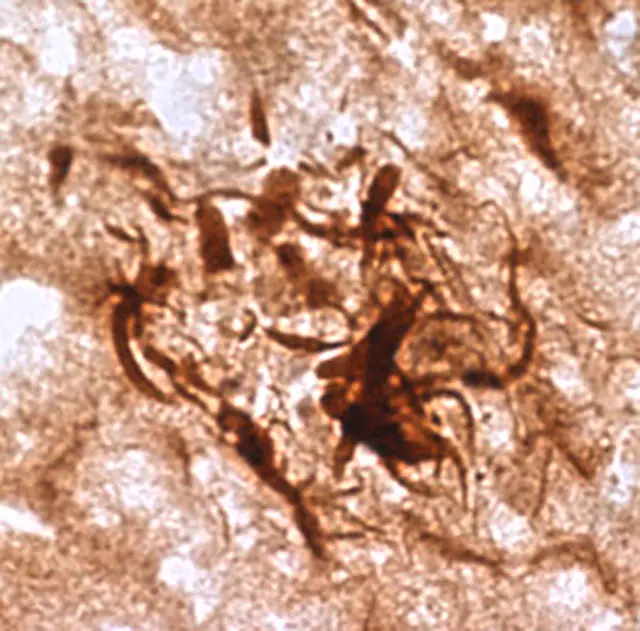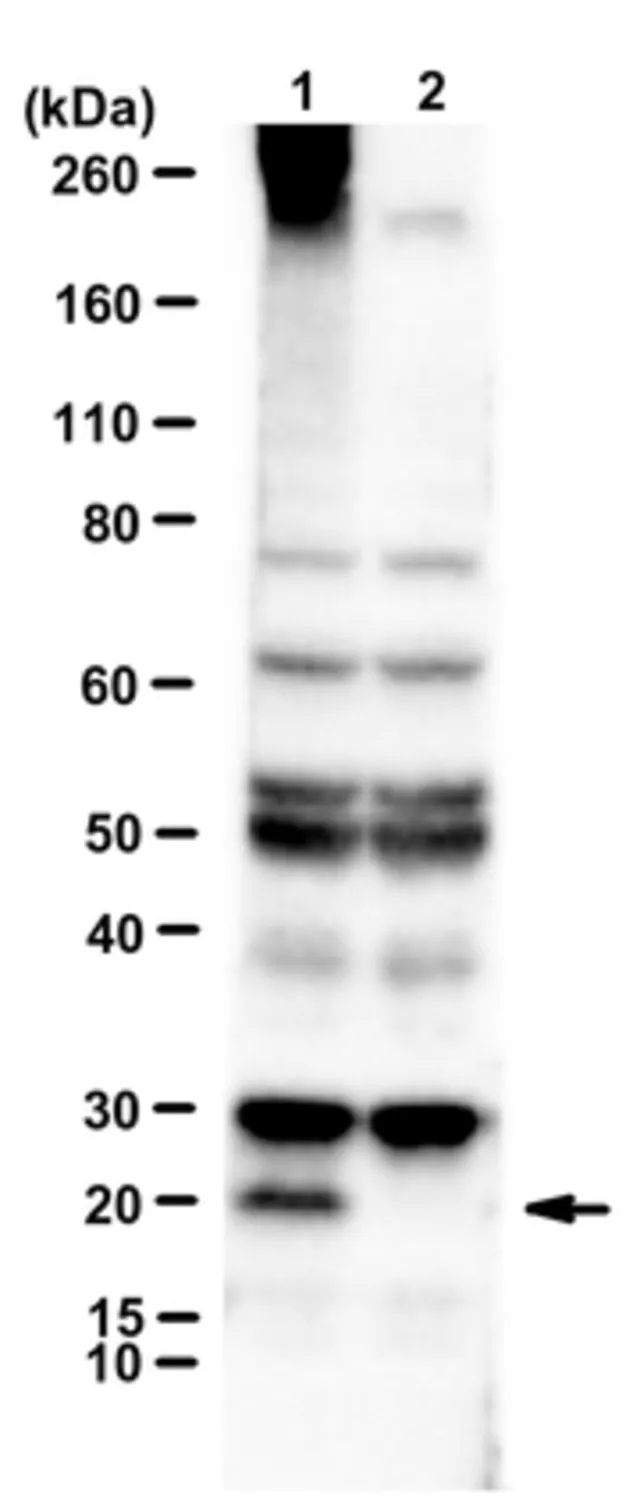您的位置:首页 > 产品中心 > Anti-RTN3 (R458)
产品别名
Anti-RTN3 (R458)
Reticulon-3, HAP, Homolog of ASY protein, Neuroendocrine-specific protein-like 2, Neuroendocrine-specific protein-like II, NSP-like protein 2, NSP-like protein II, NSPLII
基本信息
| eCl@ss | 32160702 |
| NACRES | NA.41 |
| General description【一般描述】 | Reticulon-3 (UniProt O95197; also known as HAP, Homolog of ASY protein, Neuroendocrine-specific protein-like 2, Neuroendocrine-specific protein-like II, NSP-like protein 2, NSP-like protein II, NSPLII) is encoded by the RTN3 (also known as ASYIP, NSPL2) gene (Gene ID 10313) in human. Reticulon-3/RTN3 belongs to the RTN family of proteins characterized by their C-terminal reticulon homolog domain (RHD; a.a. 844-1032 in RTN3). There exist four mammalian reticulons (RTN1-4), with each member having multiple spliced isoforms. RTN3 is expressed in neurons and localized in axons and growth cones. RTN3 overexpression in neurons results in reduced amyloid deposition in murine models of Alzheimer′s disease (AD). Consistently, RTN3 deficiency elevates BACE1 protein level and enhances amyloid deposition in AD mice that express human mutant APP and presenilin-1 transgenes. Human RTN3 is a multipass ER and golgi membrane protein with 3 membrane helical regions (a.a. 864-997, 948-968, 973-993) and four cytoplasmic regions (a.a. 2-863, 888-947, 969-972, 994-1032). Its C-terminal RHD mediates interaction with FADD (a.a. 987-1032) and BACE1 (a.a.1000-1002). Alternative splicings generate 7 isoforms (UniProt O95197-1 througth O95197-7). |
| Specificity【特异性】 | Target specificity of this rabbit polyclonal antiserum has been verified by Western blotting analysis of RNAi-mediated RTN3-knockdown in Swedish mutant APP-expressing 125.3 cells and tissue samples from RTN3-knockout mice. Immunogen sequence is located near the C-terminus of all human/mouse/rat isoforms reported by UniProt (O95197, O95197, Q9ES97) with the exception of human isoforms 5 and 6 (O95197-5 and O95197-6), which lack the target sequence. |
| Immunogen【免疫原】 | Conjugated linear peptide corresponding to a sequence near the C-terminus of human RTN3. |
| Application【应用】 | Immunofluorescence Analysis: A 1:2,000 dilution from a representative lot immunostained dystrophic neurites in Alzheimer′s diseased (AD) human frozen brain tissue sections by fluorescent immunohistochemistry (Courtesy of Wanxia He, The Cleveland Clinic Foundation, U.S.A.). Immunohistochemistry Analysis: A 1:2,000 dilution from a representative lot immunostained dystrophic neurites in Alzheimer′s diseased (AD) human frozen brain tissue sections (Courtesy of Wanxia He, The Cleveland Clinic Foundation, U.S.A.). Western Blotting Analysis: A 1:2,000 dilution from a representative lot detected RTN3 isoforms in 50 µg of brain tissue lysate from a wild-type, but not RTN3-knockout, mouse (Courtesy of Wanxia He, The Cleveland Clinic Foundation, U.S.A.). Immunofluorescence Analysis: A representative lot detected RTN3 immunoreactivity partially co-localized with that of BACE1 in mouse brain tissue sections (He, W., et al. (2004). Nat. Med.10(9):959-965). Immunohistochemistry Analysis: A representative lot detected RTN3 immunoreactivity enriched in grey matter neuronal cell bodies of human brain tissue sections (He, W., et al. (2004). Nat. Med.10(9):959-965). Immunoprecipitation Analysis: A representative lot co-immunoprecipitated BACE1 with RTN3 from HEK293 and human frontal cortex membrane extracts (He, W., et al. (2004). Nat. Med.10(9):959-965). Western Blotting Analysis: A representative lot detected RTN3 isoforms expression in multiple mouse tissues, including broadly expressed ~25 kDa RTN3-A1 (UniProt Q9ES97-3), ~100 kDa fat tissue-specific RTN3-AL (UniProt Q9ES97-1), ~95 kDa brain-specific RTN3-B, and ~27 kDa RTN3-A2 (UniProt Q9ES97-4) in spinal cord. RTN3 target bands were not detected in tissue samples from RTN3-knockout mice (Shi, Q., et al. (2014). J. Neurosci. 34(42):13954-13962; He, W., et al. (2004). Nat. Med.10(9):959-965). Western Blotting Analysis: A representative lot detected RTN3 isoform 3 (UniProt O95197-3) wild-type and mutant constructs expression. Membrane integration was affected by L71K/L72K mutation or deletion of N-terminal 97 a.a., while truncation of the first 61 a.a. did not affect embrane integration. Western blotting analysis of protease K-digested HEK293 microsomal preparation indicated a cytoplasmic orientation of the C-terminal end (He, W., et al. (2007). J. Biol. Chem. 282(40):29144-29151). Western Blotting Analysis: A representative lot detected RTN3 in BACE1 immunoprecipitate from HEK293 membrane extract. A bimodal distribution showing RTN3 enrichment in subcellular fractions containing Golgi proteins and those containing ER markers was seen (He, W., et al. (2004). Nat. Med.10(9):959-965). Western Blotting Analysis: A representative lot detected RNAi-mediated RTN3-knockdown in Swedish mutant APP-expressing 125.3 cells (He, W., et al. (2004). Nat. Med.10(9):959-965). Research Category Neuroscience Anti-RTN3 (R458) Antibody, Cat. No. ABN1723, is a highly specific rabbit polyclonal antibody that targets RTN3 and has been tested in and Immunofluorescence, Immunohistochemistry, Immunoprecipitation, and Western Blotting. |
| Quality【质量】 | Evaluated by Western Blotting in mouse brain tissue lysates. Western Blotting Analysis: A 1:500 dilution of this antibody detected RTN3 isoforms in 50 µg of brain tissue lysate from a wild-type, but not RTN3-knockout, mouse. |
| Physical form【外形】 | Unpurified. Format: Unpurified Rabbit polyclonal antibody serum with 0.05% sodium azide. |
| Other Notes【其他说明】 | Concentration: Please refer to lot specific datasheet. |
产品性质
| biological source【生物来源】 | rabbit |
| Quality Level【质量水平】 | 100 |
| antibody form【抗体形式】 | unpurified |
| antibody product type | primary antibodies |
| clone【克隆】 | polyclonal |
| species reactivity | mouse, human |
| species reactivity (predicted by homology) | rat (based on 100% sequence homology), chimpanzee (based on 100% sequence homology) |
| technique(s) | immunofluorescence: suitable immunohistochemistry: suitable immunoprecipitation (IP): suitable western blot: suitable |
| NCBI accession no.【NCBI登记号】 | NP_001252518 |
| UniProt accession no.【UniProt登记号】 | O95197 |
| shipped in【运输】 | dry ice |
| Gene Information | human ... RTN3(10313) |
产品说明
| Target description【目标描述】 | ~95/25 kDa observed. 112.5/110.5/25.48/27.44/100.7 kDa (human isoform 1/2/3/4/7), 103.7/101.8/25.30/27.26/68.64 kDa (mouse isoform 1/2/3/4/5), 101.4/25.30 kDa (rat isoform 1/2) calculated. Uncharacterized bands may be observed in some lysate(s). |
| Storage and Stability【储存及稳定性】 | Stable for 1 year at -20°C from date of receipt. Handling Recommendations: Upon receipt and prior to removing the cap, centrifuge the vial and gently mix the solution. Aliquot into microcentrifuge tubes and store at -20°C. Avoid repeated freeze/thaw cycles, which may damage IgG and affect product performance. |
| Disclaimer【免责声明】 | Unless otherwise stated in our catalog or other company documentation accompanying the product(s), our products are intended for research use only and are not to be used for any other purpose, which includes but is not limited to, unauthorized commercial uses, in vitro diagnostic uses, ex vivo or in vivo therapeutic uses or any type of consumption or application to humans or animals. |
安全信息
| Storage Class Code【储存分类代码】 | 12 - Non Combustible Liquids |
| WGK | WGK 1 |







